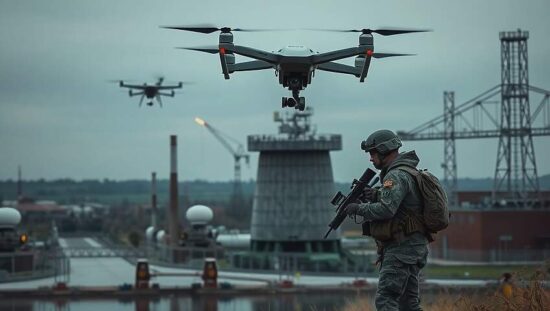German Defense and Interior Politicians Urge Bundeswehr to Take Charge of Drone Defense Nationwide
Leading defense and interior politicians from the Union party are calling for the Bundeswehr to assume responsibility for drone defense across the country, covering its own bases and critical infrastructure. Thomas Erndl, the defense policy spokesperson for the Union’s parliamentary group, emphasized the need for a comprehensive drone defense system in the face of the ongoing “Spinnennetz” operation, in which Ukraine has targeted Russian air force bases with drones. “The drone attack on Russian air force bases shows that the threat of unmanned systems is omnipresent, even in Germany” Erndl said in an interview with the Spiegel. He demands a drone defense system for every Bundeswehr installation, as well as for critical and defense-critical infrastructure.
Thomas Röwekamp, the chairman of the Defense Committee, also advocates for a legal framework adjustment. “Given the short reaction times, we need in Germany a unit that technically masters drone defense and has the necessary legal backing” Röwekamp said, adding that the Bundeswehr is the only option for this purpose. The coalition government should quickly allow the Bundeswehr to not only protect its own installations but also critical infrastructure, he emphasized.
Günter Krings, the Union’s deputy parliamentary group leader for internal affairs, also sees the Bundeswehr as being in the right, with the government, to take on this task. While a cabinet decision is usually required for the Bundeswehr’s deployment within the country, Krings suggests that, if the states request support, a legal path could be taken without a constitutional amendment. He proposes establishing a virtual joint command center where representatives of the states and the federal government can make swift decisions around the clock.
The Bundeswehr currently only has the authority to engage drones in the airspace above its own installations, with the states and the federal police responsible for the rest. The government had planned to amend the Aviation Security Act in January but failed to secure a majority in the Bundestag, as the Union deemed the proposed changes not far-reaching enough and impractical.
The Inspector of the German Army, Generalleutnant Alfons Mais, describes the situation as a “race between capabilities and countermeasures.” Until recently, the Bundeswehr had primarily relied on electronic warfare to counter drones. However, the increasing use of fiber-optic cables and artificial intelligence in drone control on the battlefields in Ukraine has rendered electronic countermeasures ineffective. “Therefore, we must again rely more on traditional ammunition in defense” Mais said.





